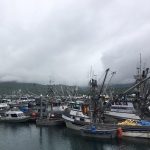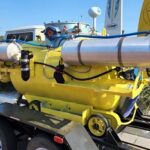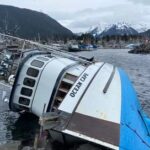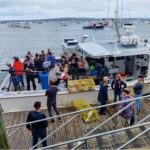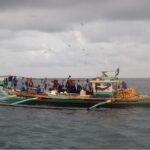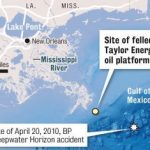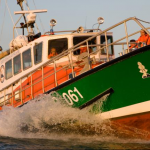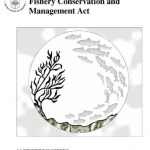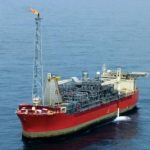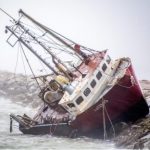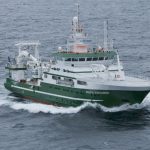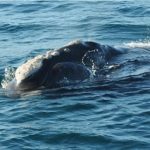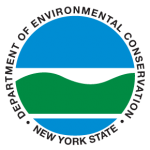Tag Archives: Stellwagen Bank
America Is Finally Spilling Its Shipwreck Secrets
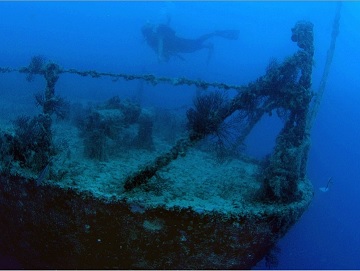 Word had gotten out about a productive patch of scallops in Stellwagen, and a commercial fishing fleet pounced. Smaller coastal boats took to the water, each one dragging a 11.5-foot-wide scallop dredge behind it. So did longer offshore vessels towing two side-by-side dredges, spanning about 30 feet. Over the coming weeks, the armada raked an area of seafloor equal to the size of Boston. Sleeping in shifts, the crews worked nonstop, shucking thousands of scallops released from the dredge in a great clattering whoosh on the wet decks. Watching this all play out, Haskell’s first concern was safety. “They were going back and forth, north and south, basically just barely missing each other,” he recalls. >click to read< 07:48
Word had gotten out about a productive patch of scallops in Stellwagen, and a commercial fishing fleet pounced. Smaller coastal boats took to the water, each one dragging a 11.5-foot-wide scallop dredge behind it. So did longer offshore vessels towing two side-by-side dredges, spanning about 30 feet. Over the coming weeks, the armada raked an area of seafloor equal to the size of Boston. Sleeping in shifts, the crews worked nonstop, shucking thousands of scallops released from the dredge in a great clattering whoosh on the wet decks. Watching this all play out, Haskell’s first concern was safety. “They were going back and forth, north and south, basically just barely missing each other,” he recalls. >click to read< 07:48
How Stellwagen Bank came to be named
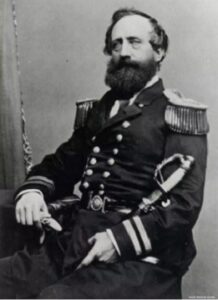 Once upon a time there was a man named Henry Stellwagen. We know that time was the mid-1800s, and Henry served in the United States Navy. We invoke good old Henry Stellwagen because a swath of nearby water is named after him; Stellwagen Bank. Fishermen had long known about shallow grounds beyond the tip of Cape Cod, stretching roughly north and west toward Gloucester. Geologists will tell you that this arc from Provincetown to Cape Ann was dry land thousands of years ago, when sea level was much lower. Like many places where the bottom rapidly rises, currents and upwells create a fertile mix, attracting fish from tiny to huge which in turn attract fishermen from across New England. But this place had never been charted. >click to read< 11:39
Once upon a time there was a man named Henry Stellwagen. We know that time was the mid-1800s, and Henry served in the United States Navy. We invoke good old Henry Stellwagen because a swath of nearby water is named after him; Stellwagen Bank. Fishermen had long known about shallow grounds beyond the tip of Cape Cod, stretching roughly north and west toward Gloucester. Geologists will tell you that this arc from Provincetown to Cape Ann was dry land thousands of years ago, when sea level was much lower. Like many places where the bottom rapidly rises, currents and upwells create a fertile mix, attracting fish from tiny to huge which in turn attract fishermen from across New England. But this place had never been charted. >click to read< 11:39
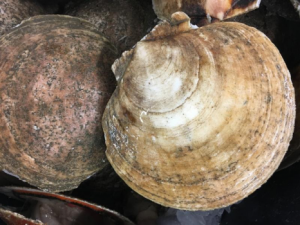
New rules for scallop fishery scheduled to take effect April 1 in Northern Gulf of Maine
A Feb. 17 presentation on upcoming changes to Northern Gulf of Maine scallop fishery management drew a number of New England fishermen to listen to scallop leaders from the New England Fishery Management Council and NOAA. The biggest change for scallop fishermen is that vessels fishing in Northern Gulf of Maine waters will be required to take industry-funded scallop observers on board when selected to do so. Additionally, a portion of Stellwagen Bank in Massachusetts Bay will open for scallop fishing. >click to read< 10:14
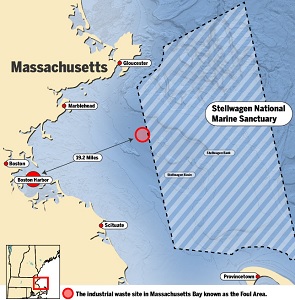
WTF?!!! A mile wide toxic waste site sits on the ocean floor near Stellwagen Bank
About 19 miles east of Boston Harbor, beside a national marine sanctuary that’s home to one of the world’s richest fishing grounds, lies one of the nation’s largest offshore dumping sites of radioactive waste.,,, David Wiley, the sanctuary’s research coordinator, led a seminal study of the area in the early 1990s. His report, which found that the federal government kept few records of what was dumped there, estimated that there could be as many as 80,000 barrels of toxic waste, most from hospitals, universities, and companies throughout the region. At least 4,000 of them were thought to contain radioactive waste, from the same sources >click to read< 09:11
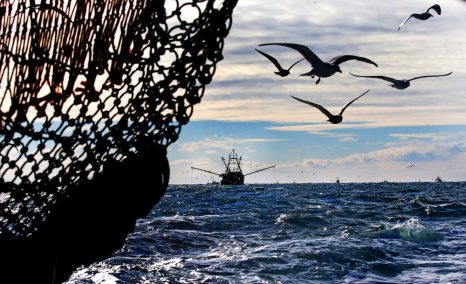
Federal regulators put an end to turbulent season in northern Gulf of Maine scallop fishery
Federal authorities are closing the scallop fishery in the northern Gulf of Maine at 12:01 a.m. Thursday after a contentious three-week season that pitted the interests of part-time, small-boat fishermen from Maine against large, full-time scallop operators. Fisheries regulators announced the closure Wednesday after small-boat fishermen – many of them Maine lobstermen operating 40- to 45-foot boats – met their annual quota of 70,000 pounds. The developments do not apply to the scallop fishery in state waters, which extend to 3 miles from shore. This year’s federal harvest has been contentious because the large, full-time boats are believed to have caught more than 1 million pounds of scallops in the northern Gulf of Maine scallop fishing area, but owing to a quirk in federal rules the fishery could not be closed until the small vessels caught 70,000 pounds. This month’s storms and unseasonable weather had kept the small boats in port, delaying their ability to meet their annual quota and close the area to the larger vessels, who were permitted to continue harvesting large quantities of scallops under federal rules. continue reading the story here 07:57
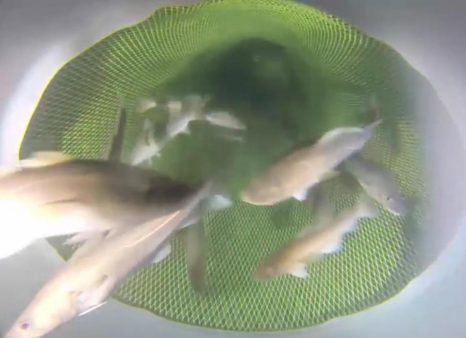
New SMAST camera can help assess cod stocks in Gulf of Maine
Researchers from UMass Dartmouth say they have successfully tested an underwater video-survey system that they hope will provide an accurate method to assess Atlantic cod stocks. In collaboration with fishermen, the research team recently placed high-resolution cameras in an open-ended commercial trawl net on Stellwagen Bank in the Gulf of Maine, known as one of the world’s most active marine sanctuaries. The cameras captured images of cod and other groundfish as they passed through the net. Periodically, researchers from UMD’s School for Marine Science & Technology closed the net for short periods to collect length, weight, and take other biological samples from some of the fish. The fish are unharmed and are returned to the sea. The system is design to be portable, so scientists can set it up on different fishing vessels. Professor Kevin Stokesbury, head researcher on the project, said the video system is an important tool at a time of uncertainty about the groundfish stock in the Gulf of Maine. Read the story here 17:57 Read the press release and watch the video here
Recreational Fishing Alliance (RFA) Opposed to 55-square-mile closure area of Stellwagen Bank
 Could a closure of Stellwagen possibly lead to other state closures in the future, if the “showroom environmentalists,” as Donofrio calls them, get their foot in the door? Will Buzzards Bay be next? Or Vineyard Sound? Area anglers and businesses supported by recreational fishing are strongly urged to attend on the 16th and oppose the closure. Read the rest here 10:21
Could a closure of Stellwagen possibly lead to other state closures in the future, if the “showroom environmentalists,” as Donofrio calls them, get their foot in the door? Will Buzzards Bay be next? Or Vineyard Sound? Area anglers and businesses supported by recreational fishing are strongly urged to attend on the 16th and oppose the closure. Read the rest here 10:21
Fishermen vent about proposal to close Stellwagen Bank, other areas for research. “playground for scientists,”
 PLYMOUTH – A charter boat captain who makes a living chasing tuna, Johnny Johnson finds it infuriating that regulators may close stretches of ocean in the name of research, but he doesn’t know when, exactly where or for how long “You’re telling me I can’t go feed my family. That’s what you’re telling me. “Our kids are hungry every single day, and we can’t have these people making these decisions about how we will survive.” Read the rest here 13:33
PLYMOUTH – A charter boat captain who makes a living chasing tuna, Johnny Johnson finds it infuriating that regulators may close stretches of ocean in the name of research, but he doesn’t know when, exactly where or for how long “You’re telling me I can’t go feed my family. That’s what you’re telling me. “Our kids are hungry every single day, and we can’t have these people making these decisions about how we will survive.” Read the rest here 13:33
Fishermen host meeting about changes at Stellwagen Bank
 Marshfield —Local fishermen are concerned about a Stellwagen Bank proposal that would eliminate a key fishing area from the region’s industry. According to the Stellwagen Bank Charter Boat Association (SBCBA), a proposed Sanctuary Environmental Research Area (SERA) would shut down all bottom fishing on 55 nautical square miles of Stellwagen Bank. more@marshfieldmariner 13:41
Marshfield —Local fishermen are concerned about a Stellwagen Bank proposal that would eliminate a key fishing area from the region’s industry. According to the Stellwagen Bank Charter Boat Association (SBCBA), a proposed Sanctuary Environmental Research Area (SERA) would shut down all bottom fishing on 55 nautical square miles of Stellwagen Bank. more@marshfieldmariner 13:41

































